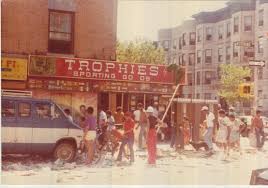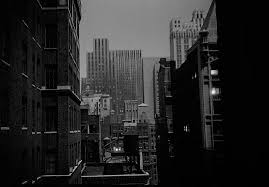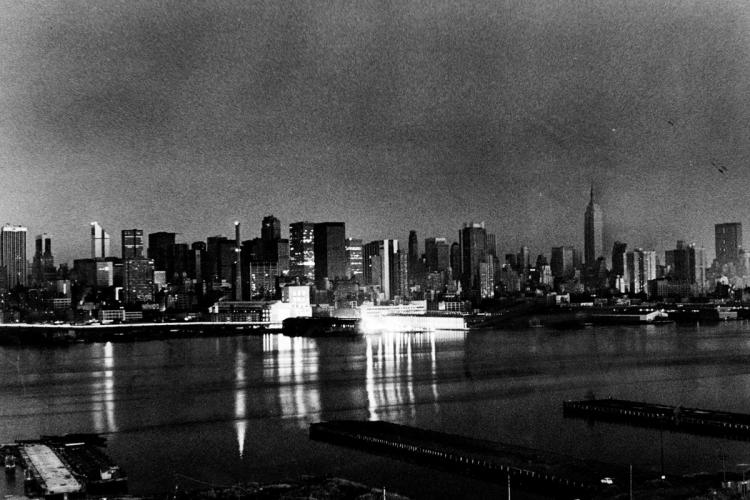July 13, 1977 – BLACKOUT!
- Sal Maiorana
- Jul 13, 2017
- 4 min read

MILWAUKEE – Another disastrous outing for Catfish Hunter as he was shelled for six runs inside five innings, not that anyone back in New York cared given what transpired there on a horrific night that came to define the deterioration and decay of the 1970s, a time when New York was anything but the greatest city on earth.
While the Yankees were getting their lights turned out in Milwaukee, the lights went off in New York, and the city literally exploded. A lightning strike at a Consolidated Edison substation along the Hudson River at approximately 8:37 p.m. tripped two circuit breakers which in turn set off an avalanche of events that methodically wiped out the power grids and eventually plunged all five boroughs and parts of Westchester into darkness at exactly 9:34 p.m.
And on that oppressively hot, muggy night, a deplorable outbreak of terror and criminality ensued from which the city did not fully recover from for more than a decade.
It’s incredible to me when I try to understand what makes people act the way they did in New York City that dreadful night. Why, with the city in obvious distress, did people become animals? They took to the streets with menace on their minds, stealing whatever they could from stores, mindlessly setting buildings and cars on fire, and in the end even turned on each other, trying to steal what had already been stolen. It was humanity at nearly its absolute worst.
TIME magazine said, “The ’77 blackout presented a rare opportunity for the powerless minority to suddenly seize power.” And it concluded, quoting the head of the National Urban League as saying, “(The underclass) in a crisis feels no compulsion to abide by the rules of the game because they find that the normal rules do not apply to them.”
Here's a slideshow that captures some of the horror:
One of the thousands upon thousands of hooligans said that night, “It's Christmastime! It's Christmastime!" as he looted as much as he could get his hands on. No, it was the furthest possible thing from Christmastime. In Brooklyn, youths were seen backing up cars to targeted stores, tying ropes around the stores' grates, and using the cars to pull the grates away before looting the stores.
One Bronx car dealership reported 50 of its vehicles were stolen as people stormed the showroom, took whatever keys they could find, and matched them to the appropriate car. More than 1,000 fires were set by arsonists and the smell of smoke hung in the city for weeks as the blazes raged and then smoldered, property damage pegged anywhere between $150 to $300 million.
Some of the figures released afterward were shocking. More than 200 Subway cars, with about 4,000 passengers, were stuck in the tunnels; more than 1,600 stores were damaged and looted; in addition to the 1,000 fires, another 1,700 false alarms were pulled; 18 cops and 44 firefighters were injured; and 3,776 were arrested, the biggest mass arrest in the city’s history, prompting beleaguered mayor Abraham Beame to call them “hoodlums” who would be “prosecuted to the fullest extent of the law.”

Until Sept. 11, 2001, it was without question New York’s darkest day. New York City was already on the brink of bankruptcy before the blackout. People, as well as businesses, even the New York Giants football team, were fleeing en masse to the suburbs, leaving tremendous voids in the boroughs. More than 600,000 jobs had been lost between 1969 and 1977, and arsonists – many with nothing to do - had been perfecting their craft for years. There’s a reason why a book and movie were titled The Bronx is Burning – in 1975 alone, there were more than 13,000 fires in the Bronx! That’s right, 13,000.
"The blackout was part of a long descent into darkness," Fred Siegel, a history professor at Cooper Union and an adviser to Rudy Giuliani's 1993 mayoral campaign, told the New York Post. "At the time, it was a nearly bankrupt city without much of a future."
If Reggie Jackson was truly the straw that stirs the drink, the blackout was the proverbial straw that broke the camel’s back, in this case, the former greatest city on earth.

As for the Yankees, who were safe and sound in Milwaukee, if not irritated by another loss, they almost pulled off a great comeback. They were down 9-3 going into the eighth, but almost pulled it out as consecutive singles by Chris Chambliss, Reggie Jackson, and Roy White loaded the bases for pinch-hitter Lou Piniella with one out. Piniella delivered a two-run single to left, and after a Bucky Dent strikeout, Mickey Rivers blasted a three-run homer to get New York within 9-8.
The Yankees then put two men on base in the ninth, but struggling Milwaukee reliever Bill Castro finally induced Roy White to ground out to first to end a game that almost everyone back home had no way of listening to, watching, or reading about the next day.





























Comments